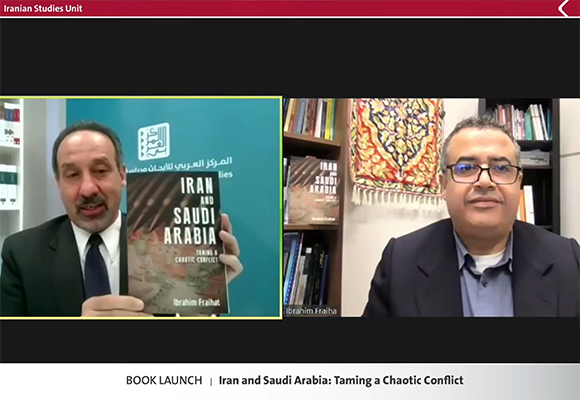 The Arab Center for Research and Policy Studies’ Iranian Studies Unit in Doha hosted Ibrahim Fraihat Dean of Student Affairs and Associate Professor in International Conflict Resolution at the Doha Institute for Graduate Studies on 28 January 2021 for the launch of his book Iran and Saudi Arabia: Taming a Chaotic Conflict. The event was chaired by Mehran Kamrava, head of the unit and Professor of Government at Georgetown University in Qatar.
The Arab Center for Research and Policy Studies’ Iranian Studies Unit in Doha hosted Ibrahim Fraihat Dean of Student Affairs and Associate Professor in International Conflict Resolution at the Doha Institute for Graduate Studies on 28 January 2021 for the launch of his book Iran and Saudi Arabia: Taming a Chaotic Conflict. The event was chaired by Mehran Kamrava, head of the unit and Professor of Government at Georgetown University in Qatar.
Fraihat began by stating that the book’s idea is derived from the existing literature focused on understanding and analyzing the conflict rather than its resolution. Therefore, after a brief backgrounder to the conflict the book focuses on its resolution. The research methodology consisted of the author’s interviews of approximately sixty scholars, policy makers, think-thank experts, and activists, along with his participation in over a dozen “track-two diplomacy” workshops.
In explaining why this is a “chaotic” conflict, Fraihat cited the challenge of defining the root causes of the conflict and disagreements over the key issues separating the two sides, as well as the inadequately defined parties to the conflict: “the conflict is run to a large extent through proxies with high level of vagueness over the nature and direction of the relationship between proxies and their patrons.” Ambiguity obscures both the parties and intra-party politics, and Fraihat noted that there is “no consensus on the ground rules or the rules of the game in this conflict”. These are challenges making it difficult to reach a solution.
Fraihat proposed a conflict resolution model based on three pillars. The first is understanding the main issues of the conflict such as security, sectarianism, regional leadership, along with external factors that need to be considered. The second pillar focuses on the establishment of a conflict management system to prevent escalation and promote better conflict management, since “better managed conflicts have a stronger chance of being resolved”. Fraihat suggested here the establishment of a Riyadh-Tehran hotline, exchange of senior government visits, setting up technical committees, undertaking confidence-building measures, and engaging in dialogue.
The third pillar is responding to the underlying causes and conditions through an approach of sustainable conflict resolution based upon restoring the regional order’s balance of power, domestic reforms, soft power reform, reform of conflict strategies, track-one diplomatic mediation, and track-two diplomacy through people-to-people dialogue including academic exchanges, dialogue, and communication. Fraihat ended by stating that “the purpose of this book is to raise the level of awareness, and lead experts and researchers to understand that solutions can be reached”.